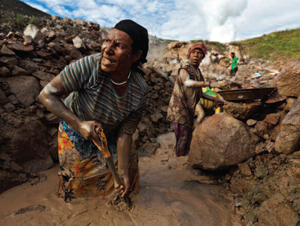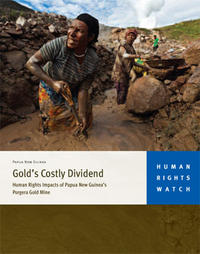
PORT MORESBY: Private security personnel employed at the Porgera gold mine in Papua New Guinea have been implicated in alleged gang rapes and other violent abuses, Human Rights Watch said in a report released today.
The Porgera mine has produced billions of dollars of gold in its 20 years of operation, and is operated and 95 percent owned by Barrick Gold, a Canadian company that is the world's largest gold producer.
The 94-page report, "Gold's Costly Dividend: Human Rights Impacts of Papua New Guinea's Porgera Gold Mine", identifies systemic failures on the part of Toronto-based Barrick Gold that kept the company from recognising the risk of abuses, and responding to allegations that abuses had occurred.
The report examines the impact of Canada's failure to regulate the overseas activities of its companies and also calls on Barrick to address environmental and health concerns around the mine with greater transparency. "We interviewed women who described brutal gang rapes by security guards at Barrick's mine," said Chris Albin-Lackey, senior business and human rights researcher at Human Rights Watch.
"We interviewed women who described brutal gang rapes by security guards at Barrick's mine," said Chris Albin-Lackey, senior business and human rights researcher at Human Rights Watch.
"The company should have acted long before Human Rights Watch conducted its research and prompted them into action".
Human Rights Watch said that in response to its investigation, Barrick has taken meaningful steps to investigate past abuses and make it less likely for similar abuses to occur in future.
Little oversight
Most of the world's mining and exploration companies are based in Canada. But Canada's government has not exercised meaningful oversight or regulation of the overseas operations of Canadian companies, Human Rights Watch said.
Bill C-300, a modest but important effort to impose greater government oversight, was defeated in Canada's House of Commons in October 2010. Barrick had lobbied vigorously against the measure.
"Canada's government is asleep at the wheel," Albin-Lackey said. "And if Barrick wants to hold itself out as a responsible corporate citizen, it should support meaningful government oversight and regulation of Canadian companies."
Papua New Guinea's sprawling Porgera gold mine has produced more than 16 million ounces of gold since opening in 1990 - an amount that would be worth more than US$20 billion at today's prices.
In 2010, Barrick's worldwide operations were on track to produce more than 7.5 million ounces of gold, an amount worth more than $9.7 billion at current prices.
Papua New Guinea has an abundance of natural resources, but poor governance and corruption have prevented this wealth from benefitting ordinary citizens. The government has failed to bring economic opportunity or deliver basic government services to Porgera, and the region is mired in poverty and violence.
Barrick maintains a private security force of nearly 450 personnel at Porgera. The mine must cope with extraordinary security challenges, including violent raids by groups of illegal miners. But Human Rights Watch research documents opportunistic, violent abuses allegedly committed by some security force members that are in no way a reaction to these threats.
Every day, hundreds of people try to eke out a living by scouring the waste rock dumps around the mine for minute traces of gold. In contrast to the participants in violent raids that the mine confronts on a regular basis, these miners are for the most part engaged in an entirely nonviolent - albeit unauthorized - practice. They face arrest by company security officers if they are caught on the waste dumps.
Rape allegations
Human Rights Watch investigated six alleged incidents of gang rape by company security personnel. In each case, women were allegedly raped after being captured by company security personnel on the waste dumps.
The women interviewed by Human Rights Watch described scenes of extreme violence. One described being gang raped by six security personnel after one of her assailants kicked her in the face and shattered her teeth. Human Rights Watch also documented cases of people who alleged that they were beaten or otherwise mistreated by guards who apprehended them on the waste dumps.
None of the women interviewed by Human Rights Watch said they had reported the alleged rapes to the local authorities or to the company. Some said their assailants had told them they would be arrested if they tried to complain.
Compounding matters, Barrick did not have any safe channels of communication that community members could use to report abuses.
Barrick has responded with appropriate vigor to the allegations brought forward by Human Rights Watch. The company opened a major internal investigation, facilitated a criminal investigation by the Papua New Guinea police, and made a commitment to take steps that could strengthen oversight and accountability for the security force at Porgera.
The alleged gang rapes appear to be part of a wider pattern, Human Rights Watch said. The company and police investigations that followed the Human Rights Watch disclosures have uncovered other cases of alleged sexual violence.
In a public statement, Barrick called the results of its internal investigation "disturbing" and announced the termination of several security personnel for involvement in, or failure to report, alleged incidents of sexual violence. Police arrested three current and former Porgera Joint Venture employees in January, 2011. Two were charged with rape and the third with inflicting grievous bodily harm.
More charges
A January 17 police statement predicted that more charges were likely to flow from their investigation and said that the arrests should serve as a warning that serious abuses will not be tolerated. That message is important but it will take work to convince many people to believe it, Human Rights Watch said.
Members of the Papua New Guinea police force are regularly implicated in incidents of torture and rape, and the force's abusive reputation makes the public reluctant to turn to it for help. If the government wants to combat impunity for rape and other serious crimes, it will have to start by ensuring that the police themselves are held accountable for their conduct, Human Rights Watch said.
Human Rights Watch's research also examines concerns about the health and environmental impacts of the Porgera mine. The mine dumps 16,000 tons of liquid waste into the nearby Porgera River every day. This controversial practice is out of line with current industry standards, and critics worry that it could pose health risks to communities far downstream.
Human Rights Watch called on Barrick to publish several specific sources of relevant data to allow for independent evaluation of the company's claims. The company has now agreed to make public its annual environmental reports for the first time. This is a good first step, Human Rights Watch said.
Human Rights Watch also called for the Papua New Guinea government and international donors to facilitate a public health survey of possible mercury poisoning around Porgera. Impoverished small-scale and illegal miners in the area regularly process gold ore by combining it with mercury and then burning the combined materials over an open flame. This is an extremely dangerous practice and one that local medical professionals believe may have given rise to an untreated epidemic of mercury poisoning in local communities. - Ramu Nickel Mine Watch/Pacific Media Watch
Gold's Costly Dividend - Human Rights Watch fulltext report



